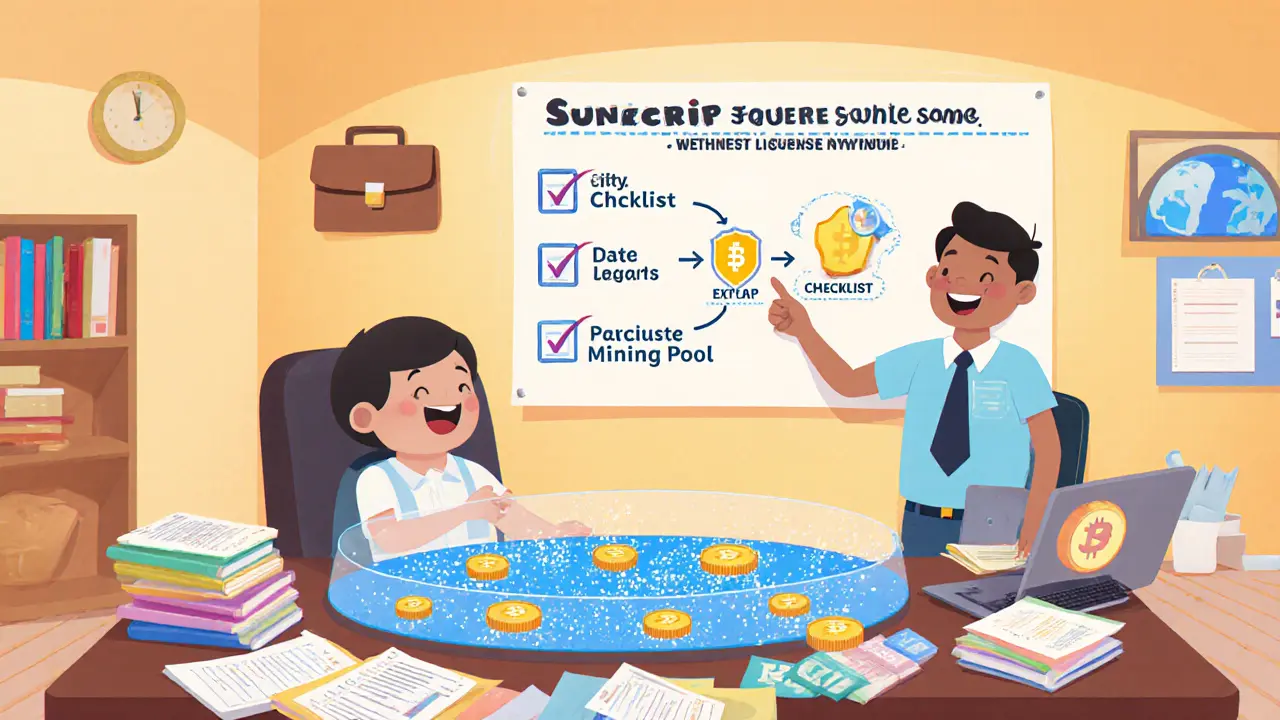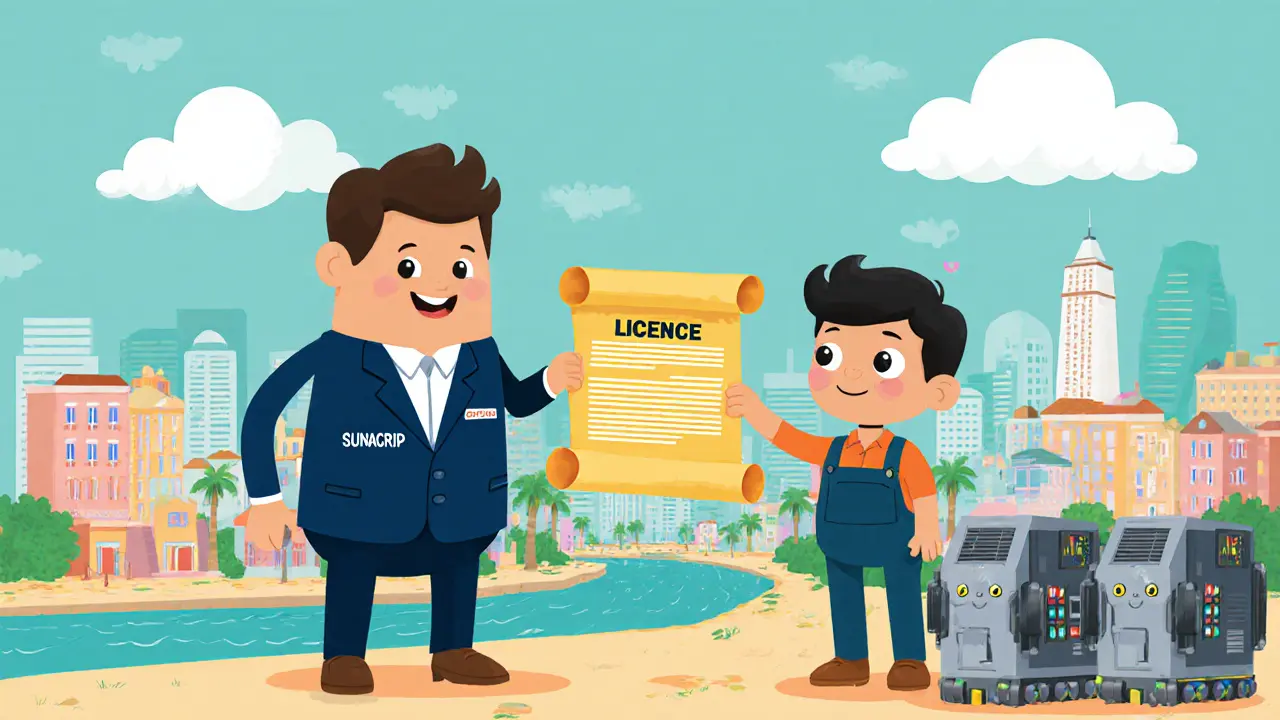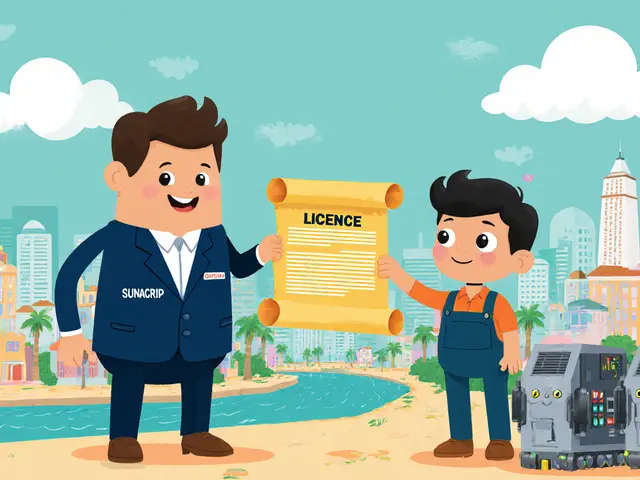Venezuela state‑licensed crypto mining is a government‑controlled framework that obliges every mining operation to obtain a license, register with official bodies, and connect to a centralized pool. If you’re thinking about setting up a rig in Caracas or partnering with a local firm, you need to navigate a maze of permits, tax codes, and reporting duties. The rules have shifted multiple times since 2020, and missing a single step can trigger equipment seizure or hefty fines. Below is a practical roadmap that covers everything you’ll need to stay legal in 2025.
Quick Takeaways
- All miners must join the National Digital Mining Pool and be listed in the Integral Miners Registry (RIM).
- Licensing is handled by SUNACRIP and can take 3‑6 months.
- Record‑keeping is mandatory for 10years; use a dedicated accounting system.
- Taxes include IGTF (up to 20%), ISLR on profits, and possible 16% VAT on exchange fees.
- Non‑compliance can lead to equipment confiscation, payment freezes, and criminal charges.
Regulatory Landscape & Key Players
The backbone of the system is the National Superintendency of Crypto Assets and Related Activities (SUNACRIP), created in 2018 to replace the older SUPCACVEN agency. SUNACRIP issues the mining license, maintains the official register, and oversees the National Digital Mining Pool. After a corruption probe that halted its operations in March2023, SUNACRIP was reorganized in March2024 and now works alongside a private‑sector body, CAVEMCRIP, which provides technical guidance and helps process equipment import requests.
The Central Bank of Venezuela (BCV) occasionally steps in on monetary policy, while the tax authority SENIAT enforces income‑tax and transaction‑tax rules. All of these entities interact through the National Digital Mining Pool, a government‑run platform that aggregates hash power, distributes rewards, and collects taxes in real time.
Step‑by‑Step Licensing Process
- Form a legal entity. Register a corporation or LLC with the Venezuelan Mercantile Registry. The entity must have a Venezuelan tax ID (RIF).
- Prepare the documentation. SUNACRIP requires:
- Business plan outlining expected hash rate, power consumption, and revenue projections.
- Technical specifications of each mining device (model, hash‑per‑second, power draw).
- Proof of electricity supply contracts (usually from state utility CANTV).
- Anti‑money‑laundering (AML) and Know‑Your‑Customer (KYC) procedures for any end‑users.
- Submit the application. Use SUNACRIP’s online portal (available in Spanish). Fees range from 0.5% of projected monthly revenue to a flat US$5,000 processing charge.
- Await approval. Processing takes 3‑6months. SUNACRIP may request additional clarifications or site inspections.
- Enroll in the National Digital Mining Pool. Once approved, integrate your mining software with the pool’s API. The pool assigns a miner ID that must appear on every block submission.
- Register with the Integral Miners Registry (RIM). This is a separate database that tracks all licensed miners for tax and audit purposes.
Mandatory National Digital Mining Pool Integration
The pool is not optional. All hash power must be submitted through the pool’s software, which logs every share, calculates payouts, and withholds taxes automatically. Failure to route through the pool is considered illegal mining and can result in immediate equipment seizure.
Technical integration steps:
- Download the pool client from SUNACRIP’s portal.
- Configure your miner’s URL, miner ID, and worker name as provided.
- Set up automated reporting to send daily hash‑rate and power‑usage logs to SUNACRIP’s compliance server.
Payments are made in either bolívares or the state‑issued Petro token, depending on the miner’s tax election. The pool can freeze payouts without notice if a compliance issue is flagged.

Taxation & Financial Obligations
| Tax | Base | Rate | Notes |
|---|---|---|---|
| Large Financial Transactions Tax (IGTF) | Crypto transactions not in bolívares or Petro | Up to 20% | Applies to swaps, withdrawals, and cross‑border transfers. |
| Income Tax (ISLR) | Net profit from mining rewards and sales | 15‑30% (progressive) | Calculated using Venezuela’s Income Tax Law; crypto treated as an asset. |
| VAT | Exchange service fees | 16% | Not levied on the trade itself, only on platform fees. |
SENIAT cross‑checks pool‑generated payout reports with declared income. In 2025, the agency has begun using blockchain‑analytics tools to match wallet addresses with RIM records, so under‑reporting is increasingly risky.
Record‑Keeping, Audits & Ongoing Compliance
Every licensed miner must keep a complete ledger of:
- Hardware inventory (serial numbers, purchase invoices).
- Daily hash‑rate, power consumption, and uptime metrics.
- All inbound and outbound crypto transactions, including wallet addresses.
- Tax filings and payment receipts.
The ledger must be stored in a secure, tamper‑proof system (e.g., an encrypted cloud service) and be accessible for at least ten years. SUNACRIP reserves the right to audit any miner, and audits can be triggered randomly or after a payment freeze.
Risks, Penalties & Practical Tips
Operating under the state‑licensed regime carries unique hazards:
- Payment freezes. The pool can halt payouts for weeks while investigating alleged irregularities.
- Equipment confiscation. Unregistered hardware or imports without SUNACRIP clearance are seized without compensation.
- Political volatility. Changes in government policy (e.g., a renewed ban) can render a license void overnight.
To mitigate these risks, consider the following best practices:
- Maintain a dedicated compliance officer who monitors SUNACRIP announcements and updates the RIM record promptly.
- Use a reputable local legal counsel experienced with crypto‑asset law.
- Invest in backup power solutions to offset frequent electricity outages that can trigger false compliance alerts.
- Document every import transaction and retain customs clearance paperwork for the full ten‑year period.
- Regularly reconcile pool‑generated payout reports with your internal accounting to spot discrepancies early.
Frequently Asked Questions
Do I need a separate license for mining equipment imports?
Yes. SUNACRIP issues a special import permit for each batch of ASICs or GPUs. The permit must be attached to the customs declaration, and the equipment’s serial numbers are logged in the national registry.
Can I mine Bitcoin or only the state‑issued Petro?
Both are allowed, but rewards are paid in the currency you declare when registering with the pool. Mining Bitcoin is common, but you’ll still owe IGTF and ISLR on the fiat value of any Bitcoin you convert.
What happens if SUNACRIP suspends operations again?
All licensed miners would be placed in a temporary hold‑status. Existing payouts would be frozen until the agency resumes, but equipment would not be automatically confiscated unless you breach other regulations.
Is the 10‑year record‑keeping requirement enforced?
Enforcement has been spotty, but audits have revealed penalties ranging from fines of up to 5% of monthly revenue to equipment seizure for incomplete logs. It’s safer to comply fully.
Can foreign investors own a licensed mining operation in Venezuela?
Foreign ownership is allowed only through a Venezuelan‑registered legal entity. Direct ownership of mining hardware by non‑residents is prohibited without a local partner.
By following this guide, you’ll have a clear picture of what it takes to mine legally in Venezuela in 2025. Stay on top of regulatory updates, keep meticulous records, and work with trusted local partners to avoid the pitfalls that have tripped up many newcomers.


Brooklyn O'Neill
January 5, 2025 AT 10:16Hey folks, great rundown on the Venezuelan mining scene – it’s a lot to take in, but you’ve broken it down nicely. I’d add that keeping a clear line of communication with SUNACRIP can smooth out some of those approval hiccups. Also, consider partnering with a local utility to lock in stable electricity rates, it saves headaches later. Remember, the community of licensed miners is pretty collaborative, so don’t hesitate to share best‑practices.
Ciaran Byrne
January 5, 2025 AT 21:23Good summary. Stick to the licensing checklist. Avoid shortcuts.
Patrick MANCLIÈRE
January 6, 2025 AT 08:29Just a heads‑up for anyone eyeing Venezuela: the political climate can shift the tax percentages with little notice, so build a buffer into your cash‑flow model. Also, the National Digital Mining Pool API has a rate‑limit, so plan your reporting intervals accordingly. You might want to use a lightweight ledger tool that can auto‑export CSVs for the auditors. Finally, keep an eye on SUNACRIP’s official bulletin – they post updates in Spanish, but Google Translate does the trick.
Carthach Ó Maonaigh
January 6, 2025 AT 19:36Honestly, trying to mine in Venezuela feels like signing up for a never‑ending reality TV show where the producers keep changing the rules mid‑season. The state‑run pool is the star of the show, and if you don’t dance to its API, you get booted off the stage. Licensing through SUNACRIP is as swift as watching paint dry, especially when they decide to ask for a fresh site inspection for no good reason. Your paperwork has to list every watt you plan to consume, which is ridiculous when the grid is already flickering on and off. Import permits for each ASIC are a bureaucratic nightmare that makes you wonder if the government actually wants foreign hardware in the country. The tax regime reads like a novel: IGTF can suck up to twenty percent, ISLR climbs up to thirty, and there’s a sweet sixteen percent VAT on exchange fees you didn’t even know existed. All of this is logged by the pool in real time, so there’s no hiding any shady moves. If you slip up, expect the pool to freeze your payouts faster than a hiccup, leaving you staring at a cold wallet. Equipment seizures are not just rumors; they happen to anyone who forgets to register a single GPU. Political volatility adds the final spice, because a new decree can render your freshly‑minted license meaningless overnight. Keep ten years of records handy, because auditors love digging through dusty archives for missing serial numbers. Backup power isn’t just a convenience; it’s a lifeline that can prevent false alarms and costly fines. A dedicated compliance officer can save you from an unexpected freeze, but they’re also another cost to factor in. Don’t forget to reconcile pool reports with your own books, or you’ll be caught off guard during an audit. In short, mining in Venezuela is a high‑stakes game of paperwork, politics, and patience.
Kamva Ndamase
January 7, 2025 AT 06:43Whoa, you’ve nailed the madness, and I’m shouting from the rooftops – the only thing crazier than the regulations is trying to get a single chip through customs without a Mozart‑level performance. If you’re brave enough to dance with SUNACRIP, make sure your import paperwork sings in perfect harmony, or you’ll watch your rig vanish like a magician’s rabbit. Trust me, a little extra cash for a local fixer can be the difference between a humming farm and an empty warehouse.
bhavin thakkar
January 7, 2025 AT 17:49Picture this: a thunderstorm of bureaucracy, lightning strikes of tax notices, and you, the lone miner, clutching a ledger like a shield. The drama isn’t over until the final audit, when the auditors swing their mighty pens and either bless you with a nod or doom you to a confiscation frenzy. Every missed detail is a gasp in this opera, and the audience-SUNACRIP-never forgets a slip.
Marie Salcedo
January 8, 2025 AT 04:56Stay positive and keep those records tidy!
Kristen Rws
January 8, 2025 AT 16:03Ths guide is vry helpful, thnks 4 sharing! I wll make sure to keep a deep copy of all docs, just incase. The tax thingz are weird but we can handle it.
Fionnbharr Davies
January 9, 2025 AT 03:09It’s fascinating how the state’s desire to control has birthed a parallel ecosystem of compliance and ingenuity. On one hand, the regulations aim to safeguard the economy; on the other, they spark creative workarounds among miners. Finding equilibrium between following the law and sustaining profitability becomes a modern ethical dilemma. Ultimately, transparency and dialogue may pave the smoothest path forward.
Lisa Strauss
January 9, 2025 AT 14:16Love the energy here! Remember, a smile and a good rapport with local officials can turn a bureaucratic maze into a friendly stroll. Keep sharing your wins and setbacks – the community learns from every experience.
Darrin Budzak
January 10, 2025 AT 01:23I’ve been watching the updates for a while, and the pattern seems clear: patience pays off, especially when the licensing queue moves slower than a snail on a hot day. Keep your hardware ready, but don’t rush the paperwork. A calm approach reduces the risk of costly mistakes.
Andrew McDonald
January 10, 2025 AT 12:29One must appreciate the intricate ballet of regulatory compliance, yet many novices stumble over elementary filing requirements 😊. It is advisable to employ a seasoned consultant whose expertise surpasses the average layperson’s comprehension.
Enya Van der most
January 10, 2025 AT 23:36Alright, team, let’s turn this compliance grind into a powerhouse of opportunity! Grab that local legal counsel, lock down your import permits, and fire up those backup generators. Every detail you nail now fuels the next payout blast. Don’t let the paperwork dull your spark – own it, dominate it, and watch the hash rate climb!
Eugene Myazin
January 11, 2025 AT 10:43Yo, mining in Venezuela is a wild ride, but it’s also a chance to learn about a whole new culture of crypto. Grab a local coffee, chat with the pool admins, and you’ll pick up tips you won’t find in any guide. Keep it chill, stay compliant, and enjoy the vibe.
karyn brown
January 11, 2025 AT 21:49Wow, ths is sooo in‑depth! 🌟 I cant belive the tax rates are that hige. Gotta be super careful w/ those docs – one slip and boom 💥 equipment gone. Thanks 4 the guide!! 🙏
Megan King
January 12, 2025 AT 08:56Heyyy, solid post! I think its realy importnt to keep those logs clean and tight. dont forget to double check ur serial numbers and send em to SUNACRIP on time. u got this!
Keith Cotterill
January 12, 2025 AT 20:03In the grand tableau of global cryptocurrency mining, the Venezuelan regulatory apparatus is, without exaggeration, a veritable labyrinthine construct, replete with fiscal impositions, procedural formalities, and geopolitical contingencies, all of which demand a miner's unwavering diligence; consequently, one must approach the endeavour with both scholarly rigor and pragmatic foresight, lest the very act of mining devolve into an exercise in bureaucratic futility.
C Brown
January 13, 2025 AT 07:09Oh great, another country telling us how to mine – because we definitely needed more red tape. Honestly, if you enjoy waiting months for a license while your hardware gathers dust, Venezuela is the perfect playground.
Noel Lees
January 13, 2025 AT 18:16Anyone else notice how the tax code seems to target crypto exchanges more than actual miners? 🤔 It’s worth digging into the IGTF exemptions – there might be a loophole that saves a chunk of profit. Let’s keep the conversation alive and share any findings!
Adeoye Emmanuel
January 14, 2025 AT 05:23The saga of Venezuelan crypto mining is, in essence, a modern epic where humans wrestle with authority, technology, and survival. Each ledger entry becomes a stanza, each compliance report a verse, and the final audit a climax that decides whether the protagonist triumphs or is cast down. To navigate this narrative, one must wield both prudence and audacity, balancing the weight of the law with the fire of innovation. In doing so, miners not only chase hash power but also etch their story into the annals of digital rebellion.
Raphael Tomasetti
January 14, 2025 AT 16:29Leverage SUNACRIP's API, maintain AML KYC logs, and sync with RIM for seamless compliance.